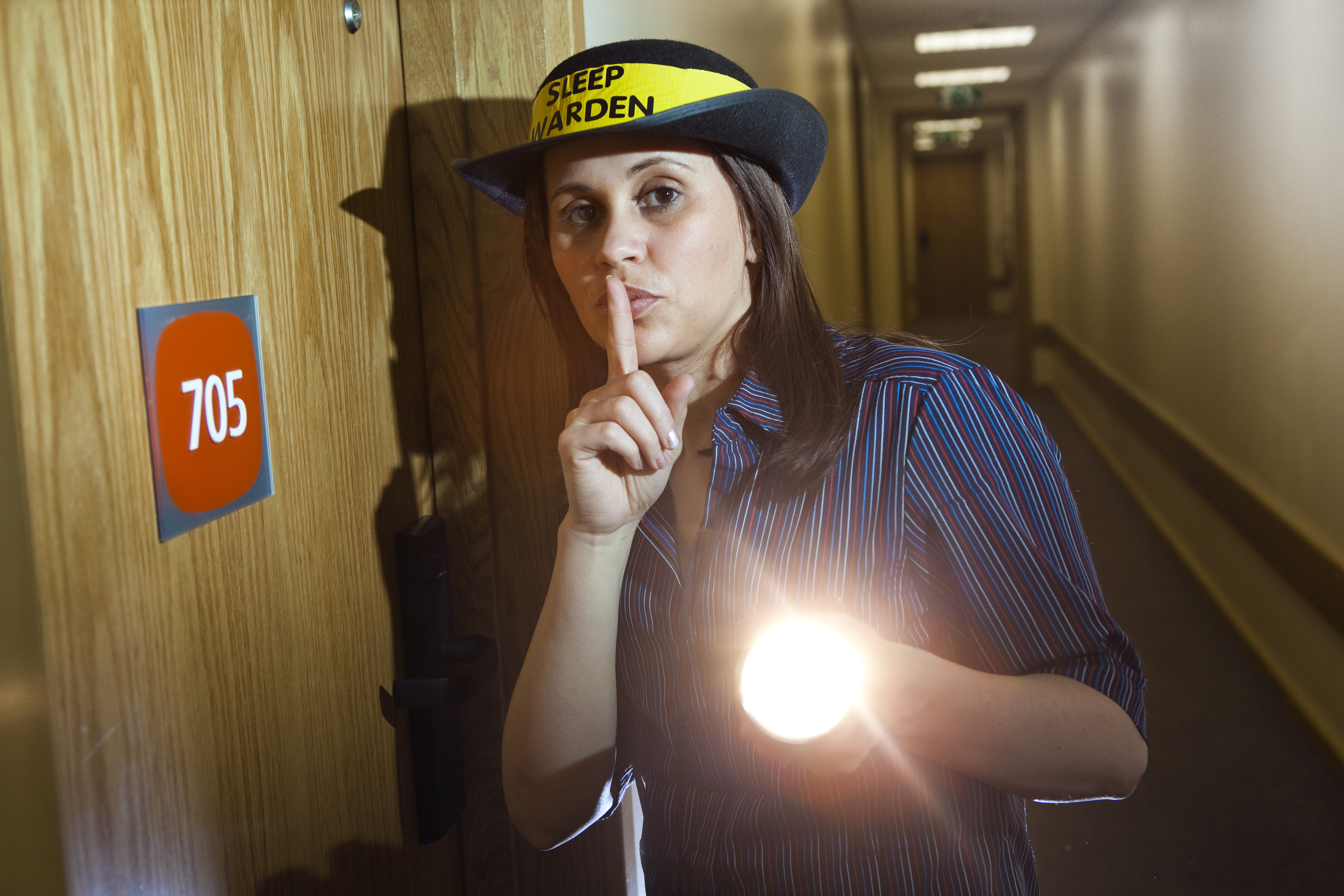Slamming doors, arguments in the hallways, blaring TVs and all-night parties.
If you’ve spent much time in hotels you’ve probably had to contend with it all once or twice.
In my Well-Mannered Traveler column on msnbc.com this week, you’ll learn how one hotel chain has come up with a novel way to deal with noisy guests.
See the column, below.

As a New Yorker, Patricia Luebke is used to sleeping through a lot of ambient noise. But there was no chance she was going to get any shut-eye with a party going on in the hallway outside her Cincinnati hotel room door.
She tried complaining to the hotel management. “But they did nothing,” Luebke said. “By the time party finally broke up, at around 4 a.m., I was screaming at the front desk. In retrospect, I should have called the police.”
If only Luebke’s hotel had sleep wardens like those now patrolling the hallways and public areas at all of the Travelodge properties in the United Kingdom. These specially-trained staff members monitor the hotels’ nighttime noise levels and issue warnings to any guest disturbing the peace.
If the noise continues after a warning, sleep wardens can tell offenders to pack up their stuff and leave so that the sweet dreams of other guests cannot be jeopardized.
Why sleep wardens? Travelodge U.K.’s Shakila Ahmed says the chain knows that people don’t check into their hotels in search of spa treatments or an upscale, luxury experience.
“They’re traveling from A to B and they need a comfortable room so they can get a good night’s sleep,” Ahmed says. So the company, which considers itself a “retailer of sleep,” conducts studies to find out what keeps guests awake at night.
In the latest survey of 6,000 adults, money worries, work-related stress and noise showed up as the major causes of sleep deprivation.
Beyond keeping rates low, a hotel can’t do much about the first two sleep-inhibitors. But Travelodge UK decided to try to tackle the third. So in addition to sending sleep wardens into the halls, the chain has asked its hotels to reschedule deliveries so that rumbling, sleep-interrupting trucks don’t arrive too early in the morning.
“We’re not saying you need to be in bed with the lights out by a certain time,” said Ahmed. “We’re just asking our guests to have good bedtime etiquette, and we’re letting them know that we’re going to be very serious about monitoring the noise levels in our hotels.”
Waiving the right to party
Other hotels may lack sleep wardens, but do have other strategies for dealing with noisy guests.
A popular tool is the “party waiver” presented at check-in. “This identifies that we have the right to ask guests to stop any noise after 10 p.m.,” said Tom Waithe, director of operations for Kimpton Hotels in the Pacific Northwest. “If they don’t, we can ask them to leave. They’ll forfeit any deposits or room charges and we have the right to add charges for the room of any other guests who complain about the noise as well.”
And what can be done about amorous couples who get a bit too loud? “They usually just get a knock on the door or a phone call,” Waithe said. “We hate to have to explain the noise complaint to someone in this situation.”
At the El Diablo Tranquilo Hostel in the Uruguayan beach town of Punta del Diablo, the staff patrols the dorm rooms and will ask chatting bunk mates to finish their discussion in a common area. Those playing cards or having a loud discussion will be encouraged to head down to the bar.
“If a guest refuses to move,” said owner Brian Meissner, “we cite an anonymous guest complaint and point out that we’re not asking them to leave the hostel or even to quiet down; just to move.”
Meissner pays overtime and rewards staff that have to “babysit” guests that don’t cooperate. “Nothing quiets someone down like the knowledge that they are forcing someone to sit and attend them,” he said.
Many experienced travelers have their own way of dealing with noise at hotels.
Some go the defensive route, bringing along earplugs, noise-blocking headphones, sound machines and over-the-counter or prescription sleep aids. Before reserving a room, many road warriors call ahead to find out if there are any weddings, large meetings or conventions booked into the hotel during their stay. And when checking in, some guests request rooms far away from elevators, ice machines and bars.
Others go on the offensive. Los Angeles hypnotherapist Nancy Irwin says if a complaint to the hotel manager doesn’t get results, she’ll call a noisy guest herself. “I simply say I am the night manager and that they need to keep the noise level down. It nearly always works.”
What strategy works for you?